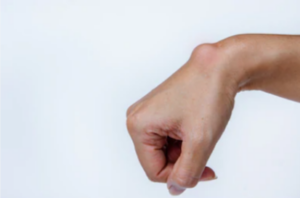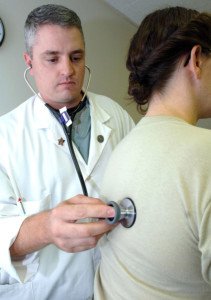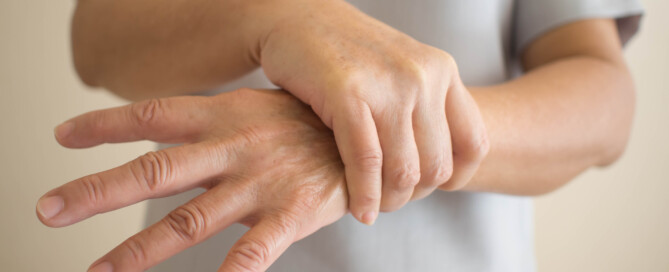Pain in Only One Wrist when Doing Pushups: Most Likely Cause

Can you bench press without a problem, but when it comes to pushups, you always get pain in only one wrist? And it’s enough pain to screw up the set.
“Pain in one wrist during pushups, or other weight bearing exercises, can be caused by a number of issues, but it almost always is due to a problem with a tendon or ligament,” says J. Mark Anderson, MD, DABFM, of Executive Medicine of Texas and who is board certified in family medicine.
“When pain is experienced in one wrist, it may be due to tendonitis, like what is seen in carpal tunnel syndrome, or other inflammatory conditions.”
If you have carpal tunnel syndrome, however, there’s a pretty good chance that you experience symptoms at times other than during exercise.
For example, your fingers may tingle or be numb; and flexing the wrist (bending the hand towards the underside of your forearm) triggers pain. There may also be spontaneous pain in the forearm.
More Likely Cause of Pain in One Wrist While Doing Pushups
“In some cases, patients may have a ganglion cyst around the wrist, hand or forearm area,” says Dr. Anderson.
“This is a non-cancerous fluid filled sac that is usually not painful on its own, but when they press on a nerve, it can cause sharp, radiating pains.”

Shutterstock/girl-think-position
One of the distinguishing characteristics of a ganglion cyst is that the pain immediately stops when the offending activity ceases.
A ganglion cyst can sometimes be seen as a lump somewhere on the wrist (though they can appear elsewhere on the hand). It feels rather rubbery and gives when you press into it.
The only way to get rid of it is needle aspiration by a doctor or, if that fails, surgery.
If you have one of these and it’s causing pain in one wrist during pushups, it’s probably not going to get much worse, but don’t be surprised if every so often, it can be felt while bench pressing or doing horizontal chest presses on a machine.
Solution to Pain in One Wrist from Doing Pushups
Here is a solution if the cause is a ganglion cyst.
I’ve had one of these for many years, and I’ve always been a fan of pushups.
The slam-dunk solution is to use pushup handles, or hold dumbbells by their stem or kettlebells by their handles.
This 100 percent solves the problem.

Freepik.com, pressfoto
Furthermore, using handles or dumbbells allows you to go deeper into the movement, recruiting more chest muscle.

Dr. Anderson is coauthor of the award-winning book, “Stay Young: 10 Proven Steps to Ultimate Health,” and host of the nationally syndicated Staying Young Show which goes to podcast as Staying Young Show 2.0.
 Lorra Garrick has been covering medical, fitness and cybersecurity topics for many years, having written thousands of articles for print magazines and websites, including as a ghostwriter. She’s also a former ACE-certified personal trainer.
Lorra Garrick has been covering medical, fitness and cybersecurity topics for many years, having written thousands of articles for print magazines and websites, including as a ghostwriter. She’s also a former ACE-certified personal trainer.
.
Top image: Freepik.com Racool_studio
Is It Safe for Kids to Run Around in Bare Feet?

Aside from bare feet getting sweaty and stinky, is there any harm in letting children run around without any shoes? (more…)
Do Babies Have a Naturally Superior Sense of Smell?

Can the nose of your baby actually detect odors and scents with far more superiority than an adult’s nose?
And if so, can you imagine how awful certain things would smell to the nose with exceptionally keen senses?
“Unlike sight which takes several months to years to develop, a baby is born with a keen sense of smell,” says Joel Gator Warsh, MD, of Integrative Pediatrics and Medicine, Studio City, CA, and part of the pediatric staff of Cedars-Sinai Hospital. (more…)
Goose Egg on Toddler’s Head: Should You See a Doctor ?
Do you know what to do if you happen to discover a goose egg on your toddler’s head, but you have no idea how it got there?
Obviously, the toddler somehow got hit in the head – either from a fall or possibly a thrown object. (more…)
Cause of Just One Finger Getting Icy Cold

It’s one thing when your entire hand feels chilly cold, but what if only one finger feels cold?
This is a very oddball symptom, but it has explanations. (more…)
Can Restless Leg Syndrome Affect Only One Leg?

Restless leg syndrome can occur in only one leg, and there are a few risk factors that can make this happen. (more…)
Can the Lungs Really Itch or Is Something Else Itching?

If your lungs are truly itching, how can you tell it’s your lungs and not something else under your skin like your ribs or muscles? (more…)
Cause of Stomach Pain in Your Baby After Breastfeeding

Does your baby experience pain in the stomach after he or she has been breastfed?
“Belly pain after breastfeeding is extremely common,” says Joel Gator Warsh, MD, of Integrative Pediatrics and Medicine, Studio City, CA, and part of the pediatric staff of Cedars-Sinai Hospital. (more…)
Can Excessive Sweating in an Infant Ever Be Normal?

Have you noticed that your baby sweats a lot?
How can a baby sweat when they don’t engage in any exercise, and the temperature in the room is normal?
What’s even more puzzling is that it’s not a vague coat of sweat; sometimes it’s quite wet.
Understandably, this can worry a parent.
“Infants and babies can sweat profusely, causing them to be soaking wet, especially during the deepest stages of the sleep cycle,” says Jacqueline Winkelmann, MD, whose experience includes that of chief medical officer, pediatric hospitalist and former chief-of-staff, Orange County, CA.
Can all the sweating in a baby ever be normal?
“Because newborns spend an average of 15-18 hours a day sleeping, they can often be found in bed very sweaty, even if the temperature in the room is comfortable,” explains Dr. Winkelmann.
“Babies sweat mostly during sleep through the head, and this is common for the first few years of life.” Most of a newborn’s active sweat glands are in the head.
“Babies sweat mostly because they have an immature nervous system. Therefore, they are not able to regulate their temperatures as efficiently as adults can. As in adults, some babies sweat more than others.”
One reason excessive sweating in a baby might frighten the parents is that they think it’s a sign of cancer. After all, it’s no secret that lymphoma causes night sweats.
But rest assured, it is VERY unlikely to be from cancer, especially if it occurs only during sleep.
If your baby sweats a lot (through the head) while you breast feed, that’s because your milk—which is warmed up by your body heat—is making your baby warm.
When to See Doctor About a Sweating Baby: Some Causes Are Serious
Dr. Winkelmann explains, “If the baby sweats while awake, in particular when feeding, notify your baby’s doctor.
“Another warning sign of something more serious can be if your baby is not gaining weight adequately and sweating while at rest or feeding.”
Possible causes are a urinary tract infection, respiratory tract infection and wound infection.
Asthma. This can cause a lot of sweating. But the baby will also be wheezing and breathing heavily.
Congenital heart disease. This can cause excessive sweating while the baby eats or plays.
Hyperhidrosis. This means excessive sweating; patients as young as an infant will sweat profusely even in a normal room temperature and light clothing.
It does not affect health, but it’s a nuisance and causes body odor (depending on where the sweating occurs) as the patient gets older if not well-managed.
Sleep apnea. Yes, babies can have this – due to large throat structures blocking the airway during sleep when the structures are very relaxed. Snoring and fitful sleep are symptoms.
SIDS. “It is important to avoid overheating infants, as it can be a risk for SIDS [sudden infant death syndrome],” says Dr. Winkelmann.
Thyroid disease. This will probably cause additional symptoms such as pale skin.
“Keep the temperature of the room comfortable. Avoid overdressing your baby.” This includes excessive wrapping or bundling.
Babies are more prone to overheating than toddlers and older, because babies cannot readily toss and turn during sleep – which is the body’s way of cooling itself, though tossing and turning can have other causes.
 Dr. Winkelmann, known as Dr. Jacq, has a special interest in sports nutrition for young athletes, teen issues and the opioid epidemic, and baby and infant product consulting. She’s an award-winning pediatrician, national and international speaker and published author.
Dr. Winkelmann, known as Dr. Jacq, has a special interest in sports nutrition for young athletes, teen issues and the opioid epidemic, and baby and infant product consulting. She’s an award-winning pediatrician, national and international speaker and published author.
 Lorra Garrick has been covering medical, fitness and cybersecurity topics for many years, having written thousands of articles for print magazines and websites, including as a ghostwriter. She’s also a former ACE-certified personal trainer.
Lorra Garrick has been covering medical, fitness and cybersecurity topics for many years, having written thousands of articles for print magazines and websites, including as a ghostwriter. She’s also a former ACE-certified personal trainer.
Causes of Green Mucus in a Baby’s Ear Include Eardrum Rupture

If there’s green gunk or mucus coming out of your baby’s ear, there’s no reason to panic (if it was blood, yes, ER time), but a ruptured eardrum is one possible cause.
There is no cause of green mucus or discharge from a baby’s ear that would justify letting it run its course without a diagnosis and treatment. (more…)







































